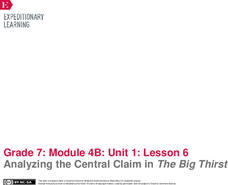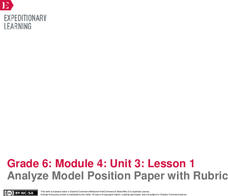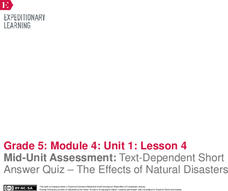National WWII Museum
A New War Weapon to Save Lives
Young historians view and analyze photos and documents from WWII that are related to blood transfusions and blood plasma. A demonstration of correct and incorrect blood donors visually shows the importance of knowing blood type. After...
ReadWriteThink
Word Recognition Strategies Using Nursery Rhymes
As a class, scholars read the poems, Humpty Dumpty, Peter, Peter, Pumpkin Eater, and Jack and Jill, in order to identify words with the same ending sound. Using their rhyming skills, learners brainstorm additional words from word...
EngageNY
Research: Identifying Categories for Our Research About the Wheelwright
Here is a fine lesson on reading and understanding expository text designed for 4th graders. With a partner, learners read a passage of text about a machine called a wheelright. This machine was commonly used in the colonial period....
Tennessee State Museum
An Emancipation Proclamation Map Lesson
Did the Emancipation Proclamation free all slaves during the Civil War? Why was it written, and what were its immediate and long-term effects? After reading primary source materials, constructing political maps representing information...
EngageNY
Module Reflection and Writing Book Reviews
Scholars take time to reflect on the unit and the end-of-unit writing assessment. They use a Working Conditions Reflection to help guide them through the exercise. Readers then begin working on a book review for the book they have been...
EngageNY
Relationships Between Key Scientific Concepts: Planning What Causes Earthquakes
That is ground shaking news! Scholars read Earthquake in multiple reads to determine the gist, identify cause and effect relationships, and understand vocabulary. Learners complete graphic organizers to describe what happens before and...
EngageNY
Researching about the Red Cross: What Is a Multinational Aid Organization?
Lend a helping hand. Pupils read two informational articles about international aid organizations and how they help areas affected by natural disasters. Scholars attempt to uncover the gist of each text, discussing their thoughts in...
EngageNY
Revising: Strong Conclusions for My Accessing Books Around the World Informative Paragraph
It's important that writers leave their readers with a strong and satisfying conclusion. Help your young writers develop the skills to compose a concluding sentence with the steps outlined here. After class members have had a chance to...
EngageNY
Analyzing the Central Claim in The Big Thirst
Quench the class's thirst for knowledge while building analytical skills. Scholars listen as the teacher reads excerpt from the book The Big Thirst. They then complete a close read and answer text-dependent questions from pages one...
EngageNY
Introducing Module 4B: “Water Is Life”
Learners take a gallery walk around the classroom to view various images and quotes. As they walk, they write down what they notice and wonder about what they see. After discussing their notice and wonder notes, they read the...
EngageNY
Analyze Model Position Paper with Rubric
It's time to choose a position! Scholars read a model position paper about fracking to practice identifying the topic and argument. Then, working with a partner, they use a rubric to assess the essay.
EngageNY
Identifying How Text Features Support Arguments: “The Exterminator"
Half and half. Split the class in half to gain a full understanding of sidebars. Pupils work in groups to discuss sidebars in text. Half of the groups read Seriously Sick, and the other half reads Killer Genes. They read using...
EngageNY
Mid-Unit Assessment: Text-Dependent Short-Answer Quiz—The Effects of Natural Disasters
Readers complete a mid-unit assessment by reading the text How Do Hurricanes Form? They answer text-dependent questions about hurricanes with short answer and sequencing. Learners then participate in a read aloud and text chunking...
Illustrative Mathematics
Setting Goals
Setting financial goals is a common occurrence in middle school that your learners can practice using this activity. They will be able to solve for how many hours Seth needs to work to save up for a skateboard, helmet, and trip. The...
EngageNY
Taking Notes Using a Graphic Organizer: Inferring About Work and Play in Colonial America
What was life like in colonial America? Follow this lesson and your pupils will find out what people in colonial times did for work and for fun. Ask learners to compare and contrast the two texts and explain what the reading helped them...
Reed Novel Studies
No Talking: Novel Study
Many of the world's most inspirational sayings are attributed to Mahatma Gandhi. Using the No Talking novel study, pupils research and write about one of his sayings. Additionally, they practice alliteration and write a quintet that...

















